 Some Supporting Actress performances are more of a time capsule than others. And it's often those one-hit wonders, the singly nominated performers who disappear into relative obscurity shortly after their nomination, who remind us how distant the recent past actually is. Consider, for example, the memorable -- but largely forgotten -- work of...
Some Supporting Actress performances are more of a time capsule than others. And it's often those one-hit wonders, the singly nominated performers who disappear into relative obscurity shortly after their nomination, who remind us how distant the recent past actually is. Consider, for example, the memorable -- but largely forgotten -- work of...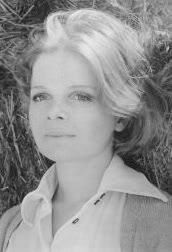
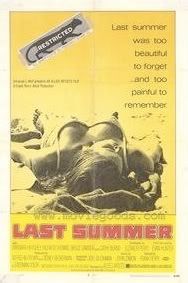
...Catherine Burns in Last Summer (1969)
approximately 40 minutes and 23 seconds
14 scenes
roughly 42% of film's total running time
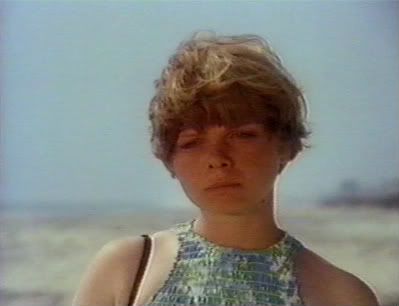 The only thing Burns's Rhoda shares with the others is status. All are in high school and all are children of privilege, summering with their parents on an island off the Long Island shore.
The only thing Burns's Rhoda shares with the others is status. All are in high school and all are children of privilege, summering with their parents on an island off the Long Island shore.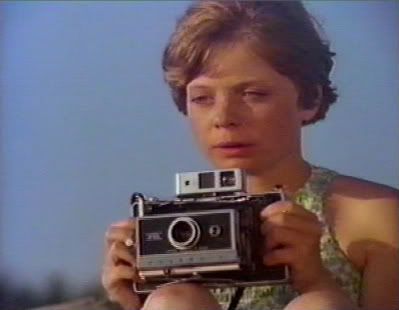 But where Sandy (Hershey), Dan (Davison) and Peter (Thomas) are all basically attractive, moderately athletic, and socially confident, Burns's Rhoda is fleshier, paler, and notably lacking in the basic social skills of teenagery. Where Hershey's Sandy and Davison's Dan might be captains of teams or presidents of cool clubs, Burns's Rhoda is "on the newspaper," writing a weekly column somewhat ominously titled "Feelings."
But where Sandy (Hershey), Dan (Davison) and Peter (Thomas) are all basically attractive, moderately athletic, and socially confident, Burns's Rhoda is fleshier, paler, and notably lacking in the basic social skills of teenagery. Where Hershey's Sandy and Davison's Dan might be captains of teams or presidents of cool clubs, Burns's Rhoda is "on the newspaper," writing a weekly column somewhat ominously titled "Feelings."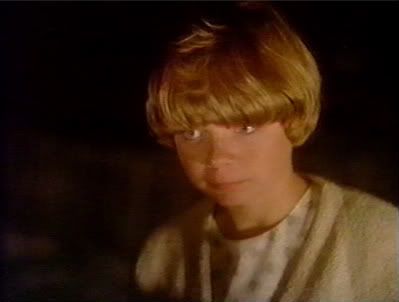 Perhaps the most compelling thing about Burns's Rhoda -- certainly the character trait that most digs under Sandy's skin -- is her comparative fearlessness. Where the others build their relationship playing a drinking game called "Absolute Truth," the very premise of which presumes that its players possess elided secrets, Burns's Rhoda has nothing to hide. She may be afraid of water and unable to swim but she tells everyone so.
Perhaps the most compelling thing about Burns's Rhoda -- certainly the character trait that most digs under Sandy's skin -- is her comparative fearlessness. Where the others build their relationship playing a drinking game called "Absolute Truth," the very premise of which presumes that its players possess elided secrets, Burns's Rhoda has nothing to hide. She may be afraid of water and unable to swim but she tells everyone so.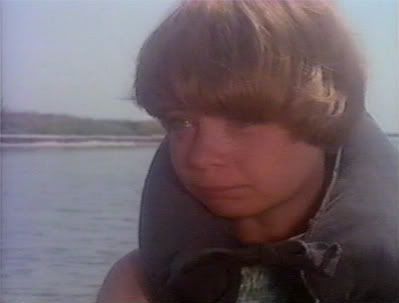 Burns's Rhoda wears her heart, her past and her convictions on her sleeve. There is little mystery about her. For Hershey's Sandy, this brazen frankness poses an unexpected threat, as the prettier girl has come to rely upon her manipulation of mystery to sustain the attention she so desperately needs. For Thomas's Peter, Rhoda's simple sincerity offers a refreshing respite from the myriad games of adolescent social climbing.
Burns's Rhoda wears her heart, her past and her convictions on her sleeve. There is little mystery about her. For Hershey's Sandy, this brazen frankness poses an unexpected threat, as the prettier girl has come to rely upon her manipulation of mystery to sustain the attention she so desperately needs. For Thomas's Peter, Rhoda's simple sincerity offers a refreshing respite from the myriad games of adolescent social climbing.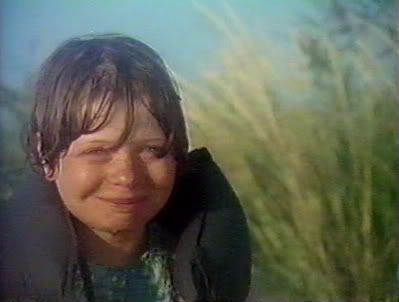 The unanticipated connection between Peter and Rhoda -- he finds her unwavering genuineness exhilarating and she revels in the attention he gives her -- is the pivot upon which the plot of this strangely misshapen narrative about adolescent cruelty turns.
The unanticipated connection between Peter and Rhoda -- he finds her unwavering genuineness exhilarating and she revels in the attention he gives her -- is the pivot upon which the plot of this strangely misshapen narrative about adolescent cruelty turns.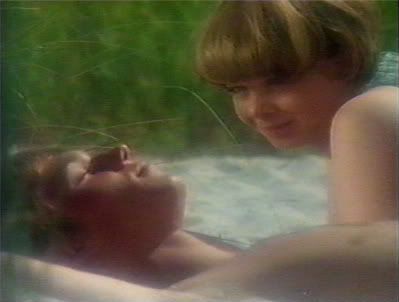 Even as she folds into this curious cohort of summer friends, and even as her relationship with Thomas's Peter evolves, Burns's Rhoda remains ever on the outside. This derives partially from Rhoda's fearless willingness to forcefully articulate a contrary opinion, especially regarding the many schemes and theories Hershey's Sandy uses to amuse herself.
Even as she folds into this curious cohort of summer friends, and even as her relationship with Thomas's Peter evolves, Burns's Rhoda remains ever on the outside. This derives partially from Rhoda's fearless willingness to forcefully articulate a contrary opinion, especially regarding the many schemes and theories Hershey's Sandy uses to amuse herself.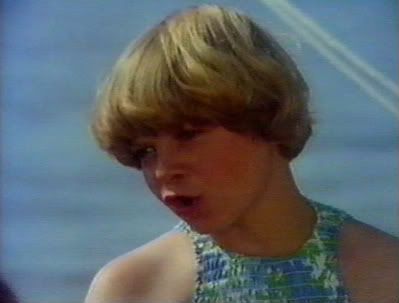 At the same time, Burns's Rhoda is undeniably an outsider among insiders and the narrative builds by staging scenarios in which this disparity is underscored.
At the same time, Burns's Rhoda is undeniably an outsider among insiders and the narrative builds by staging scenarios in which this disparity is underscored. Perhaps most centrally, in Burns's famous monologue, Burns's Rhoda shares the painful story of her mother's death as a way of proving herself to her new friends. Yet, even then, the story itself is not enough for Hershey's Sandy, who scoffs that Rhoda's wrenching tale is only about something that happened to her, not about anything special she herself did. (Only when Rhoda confesses that she spat on her dead mother's grave does she earn a glimmer of respect from Sandy, who finally welcomes the outsider in with a ritual hairwashing.)
Perhaps most centrally, in Burns's famous monologue, Burns's Rhoda shares the painful story of her mother's death as a way of proving herself to her new friends. Yet, even then, the story itself is not enough for Hershey's Sandy, who scoffs that Rhoda's wrenching tale is only about something that happened to her, not about anything special she herself did. (Only when Rhoda confesses that she spat on her dead mother's grave does she earn a glimmer of respect from Sandy, who finally welcomes the outsider in with a ritual hairwashing.)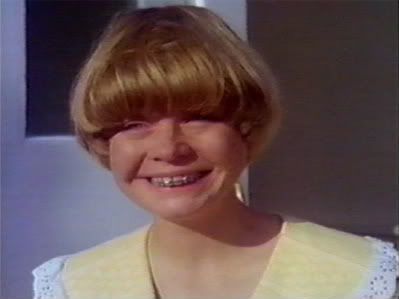 Of course, in Sandy's world, each gruelling test for peer approval must be followed by a more potentially humiliating one. First, Rhoda must agree to buy and wear a new bikini.
Of course, in Sandy's world, each gruelling test for peer approval must be followed by a more potentially humiliating one. First, Rhoda must agree to buy and wear a new bikini.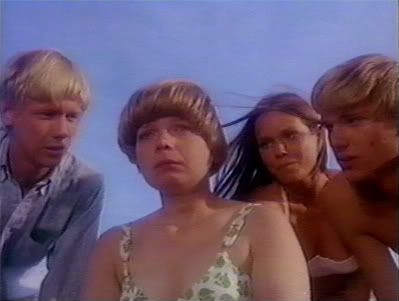 Then she must agree to go on a blind computer date -- a malicious prank instigated by Sandy long before -- else risk the disapproval of her new friends.
Then she must agree to go on a blind computer date -- a malicious prank instigated by Sandy long before -- else risk the disapproval of her new friends. Sandy stages each of these challenges to Rhoda's sense of self as tests of Rhoda's willingness to stifle her own brazen integrity as testament to her devotion to the group. More insidiously, however, each scheme stealthily aims to humiliate Rhoda and thus disrupt Peter's emerging affections for her (early on it's clear that Sandy's jealousy derives not because Sandy cares for Peter at all but because she dislikes anyone stealing attention that she feels is rightfully hers).
Sandy stages each of these challenges to Rhoda's sense of self as tests of Rhoda's willingness to stifle her own brazen integrity as testament to her devotion to the group. More insidiously, however, each scheme stealthily aims to humiliate Rhoda and thus disrupt Peter's emerging affections for her (early on it's clear that Sandy's jealousy derives not because Sandy cares for Peter at all but because she dislikes anyone stealing attention that she feels is rightfully hers).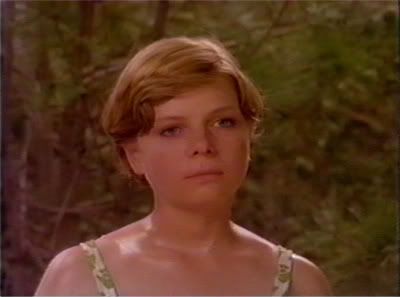 The final test comes when Sandy lures Rhoda, along with the boys, to a clearing in the forest. This clearing also happens to be the site where, for the crime of biting her hand, Sandy killed her pet gull earlier in the film. (Of course, at this point, attentive viewers has noticed that Rhoda also bit Sandy's hand just the night before, when the computer date devolved into devastating violence and Rhoda refused to be quieted when Sandy tried to cover her mouth.) At this moment in this same clearing, Sandy will dispatch with Rhoda in a comparably brutal way, as Sandy leads both boys in a collective sexual assault to once again make Rhoda an outsider and also fortify Sandy's control of the insiders.
The final test comes when Sandy lures Rhoda, along with the boys, to a clearing in the forest. This clearing also happens to be the site where, for the crime of biting her hand, Sandy killed her pet gull earlier in the film. (Of course, at this point, attentive viewers has noticed that Rhoda also bit Sandy's hand just the night before, when the computer date devolved into devastating violence and Rhoda refused to be quieted when Sandy tried to cover her mouth.) At this moment in this same clearing, Sandy will dispatch with Rhoda in a comparably brutal way, as Sandy leads both boys in a collective sexual assault to once again make Rhoda an outsider and also fortify Sandy's control of the insiders.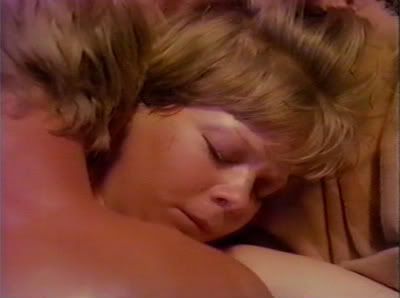 Last Summer is basically a portrait of peer pressure (albeit before the term "peer pressure" was in wide circulation) and, as such, the narrative endeavors to demonstrate how the interpersonal dynamics of teen relationships can influence "good" kids to make "bad" decisions. In 1969, the film used clearly adult actors, most of whom were in their early or mid-20s, to play characters who, by narrative detail and circumstance, are more likely in their mid-teens (remember the legal drinking age in New York state in 1969 was 18). The age incongruity of this casting tosses off the balance of the film in subtle but important ways, at least for contemporary audiences. Basically, rather than feeling like teens aspiring to a level of maturity they don't yet possess, the characters in Last Summer come off like adults acting immaturely. And while this didn't seem to bother contemporary reviewers of the film, for viewers who have seen Larry Clark's films, Welcome to the Dollhouse, or even mainstream teen flicks like Cruel Intentions or Foxes, Last Summer might feel as oddly inauthentic as it did to me. (That said, it's important to remember that Last Summer is possessed of a level of erotic frankness, sexualized violence and incidental nudity that would likely make it difficult to film even today with age-congruent actors. To film remake this film now, especially with any nudity, you'd probably need actors who were 18, at least to receive distribution in the U.S, and so it likely be easier just to tame everything down and make it for the Lifetime network. Moreover, it can be hard to remember how infrequently the subject of rape and sexual assault had been actually "seen" on screen in 1969. All of which is to say I can intellectually understand why these actors are so much older than their characters but which doesn't alleviate my difficulties with the acting approaches used in the film.)
Last Summer is basically a portrait of peer pressure (albeit before the term "peer pressure" was in wide circulation) and, as such, the narrative endeavors to demonstrate how the interpersonal dynamics of teen relationships can influence "good" kids to make "bad" decisions. In 1969, the film used clearly adult actors, most of whom were in their early or mid-20s, to play characters who, by narrative detail and circumstance, are more likely in their mid-teens (remember the legal drinking age in New York state in 1969 was 18). The age incongruity of this casting tosses off the balance of the film in subtle but important ways, at least for contemporary audiences. Basically, rather than feeling like teens aspiring to a level of maturity they don't yet possess, the characters in Last Summer come off like adults acting immaturely. And while this didn't seem to bother contemporary reviewers of the film, for viewers who have seen Larry Clark's films, Welcome to the Dollhouse, or even mainstream teen flicks like Cruel Intentions or Foxes, Last Summer might feel as oddly inauthentic as it did to me. (That said, it's important to remember that Last Summer is possessed of a level of erotic frankness, sexualized violence and incidental nudity that would likely make it difficult to film even today with age-congruent actors. To film remake this film now, especially with any nudity, you'd probably need actors who were 18, at least to receive distribution in the U.S, and so it likely be easier just to tame everything down and make it for the Lifetime network. Moreover, it can be hard to remember how infrequently the subject of rape and sexual assault had been actually "seen" on screen in 1969. All of which is to say I can intellectually understand why these actors are so much older than their characters but which doesn't alleviate my difficulties with the acting approaches used in the film.)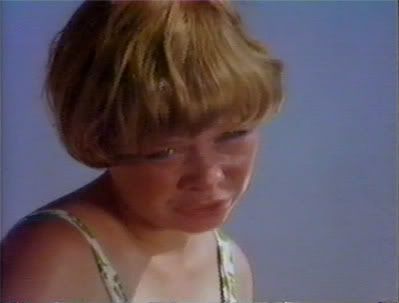 Notably, however, Catherine Burns was the oldest among the principal actors yet it's her performance that feels the most authentic. Indeed, there are times when Burns's pudgy cheeked pouts and grins make her seem barely twelve. (Only Thomas, who was about eighteen at the time of filming, is similarly effective; Davison and Hershey, while not bad, definitely feel like grownups playing callow youths.)
Notably, however, Catherine Burns was the oldest among the principal actors yet it's her performance that feels the most authentic. Indeed, there are times when Burns's pudgy cheeked pouts and grins make her seem barely twelve. (Only Thomas, who was about eighteen at the time of filming, is similarly effective; Davison and Hershey, while not bad, definitely feel like grownups playing callow youths.)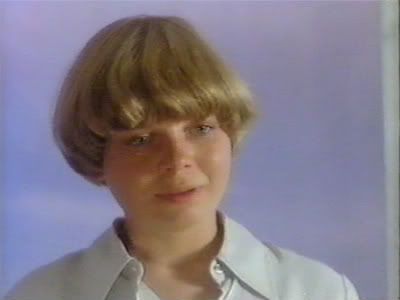 Catherine Burns's performance is a deft, alarming portrait of a precocious yet naive young woman who has no real idea of the potential for viciousness among the people she thinks she knows. As a sacrificial victim, Burns is deft in her specificity, always reminding us that Rhoda is already incredibly insightful and possessed of a generous, hopeful heart. It's devastating to see Rhoda destroyed by the shallow, sociopathic Sandy, yet it's to Burns's credit that I leave this film not knowing what happened to Rhoda but somehow believing that she'll be the survivor and the others will be the ones destroyed, either directly or indirectly, by these actions. (Indeed, I want to see the sequel that tells us who these people are in 1984; you just know that as everyone else will have become variously self-destructive messes, Rhoda will have emerged an influential feminist memoirist, her recollection of that summer's event a foundational moment in her radical theorization of sexual violence.) All told, Burns delivers a consistently compelling performance in a confined and confounding film.
Catherine Burns's performance is a deft, alarming portrait of a precocious yet naive young woman who has no real idea of the potential for viciousness among the people she thinks she knows. As a sacrificial victim, Burns is deft in her specificity, always reminding us that Rhoda is already incredibly insightful and possessed of a generous, hopeful heart. It's devastating to see Rhoda destroyed by the shallow, sociopathic Sandy, yet it's to Burns's credit that I leave this film not knowing what happened to Rhoda but somehow believing that she'll be the survivor and the others will be the ones destroyed, either directly or indirectly, by these actions. (Indeed, I want to see the sequel that tells us who these people are in 1984; you just know that as everyone else will have become variously self-destructive messes, Rhoda will have emerged an influential feminist memoirist, her recollection of that summer's event a foundational moment in her radical theorization of sexual violence.) All told, Burns delivers a consistently compelling performance in a confined and confounding film.
7 comments:
I can't say I share your feelings about the film itself - I thought it was a masterpiece and, speaking as a teenager today, accurate and applicable to the contemporary teen experience. Good to see you liked Burns's performance, though.
I can't go to the masterpiece place, but I quite liked the story and the characters. I just didn't like Davison and Hershey in the roles. Burns maneuvered the age distance well, but I felt Davison and Hershey didn't, even when covering less distance. (Indeed, I would LOVE to see this story approached with age congruent actors -- say, Dakota Fanning as Sandy and Abigail Breslin as Rhoda?) For me, something gets pitched off balance with adults so self-consciously playing these "teen" roles.
I totally know what you mean about Davison. He's a good actor but he definitely was too old. I remember being convinced by Hershey, but I'd like to see it again - I own it on VHS but I don't have a VCR.
Breslin as Rhoda would be a nightmare. Maybe Halley Feiffer? Too old now, I bet. Fanning would be a weird choice for Sandy, too. It needs to be someone more obviously sexual. Maybe Kristen Stewart?
The game they played while drinking beer was referred to as "Major Truth" not absolute truth.
I thought this film was good but pretty provocutive for the time in which it was made in however it was the 1960s...lol....but the end left me hanging and that was pretty messed up for real! But still good and made you think..
I thought this film was good but pretty provocutive for the time in which it was made in however it was the 1960s...lol....but the end left me hanging and that was pretty messed up for real! But still good and made you think..
I saw Last Summer in the theatre during its first run.
Since there has never been a widescreen, uncensored version available for home viewing, you have been deprived of what I feel is, indeed, a masterpiece.
Post a Comment